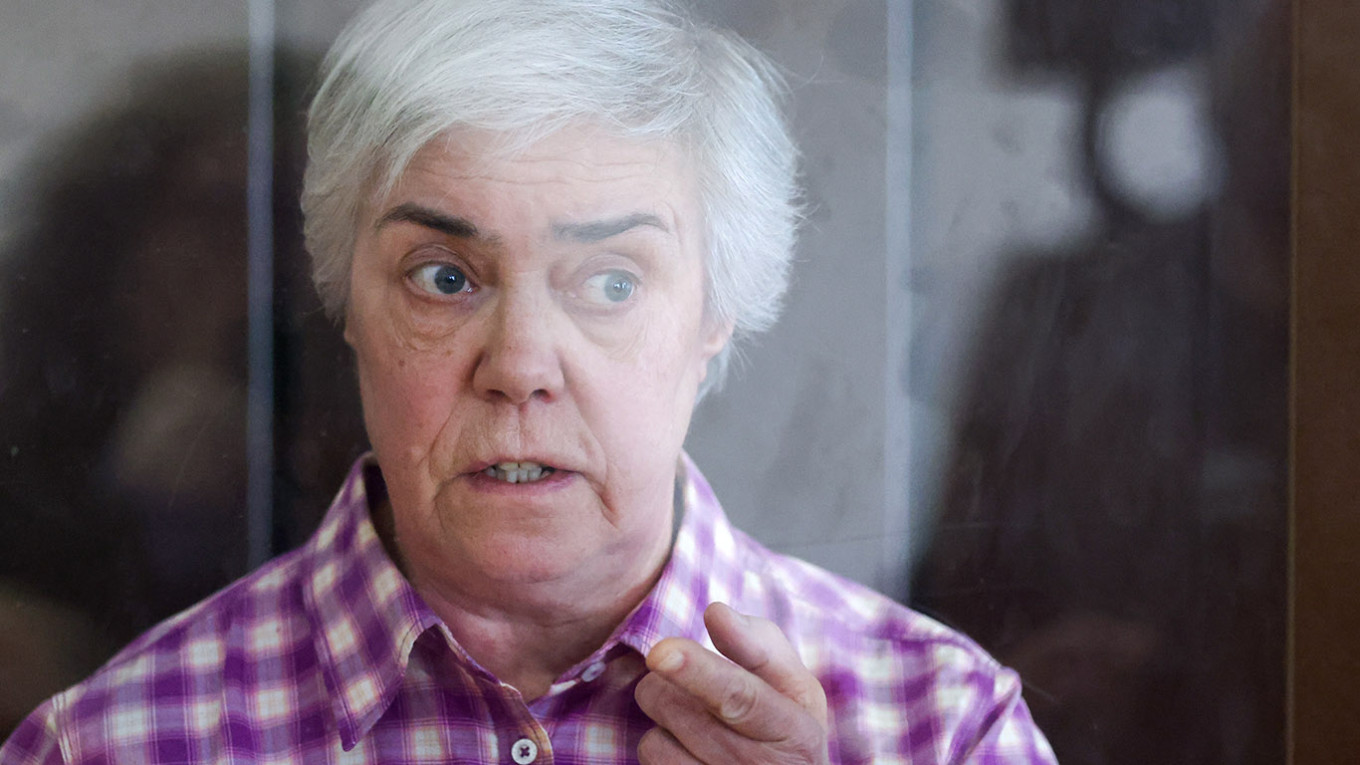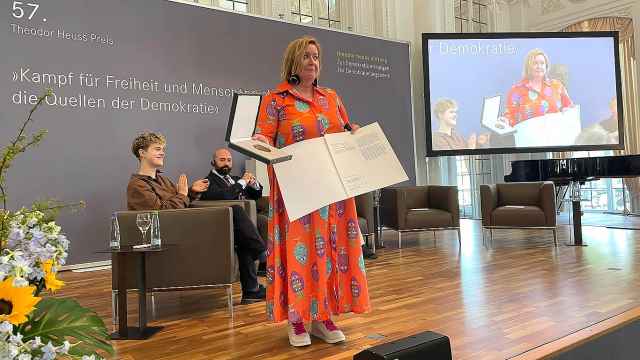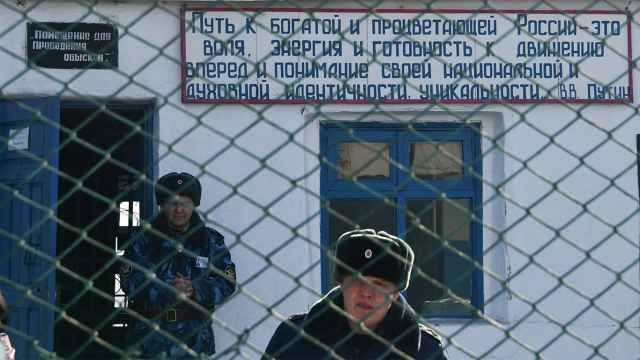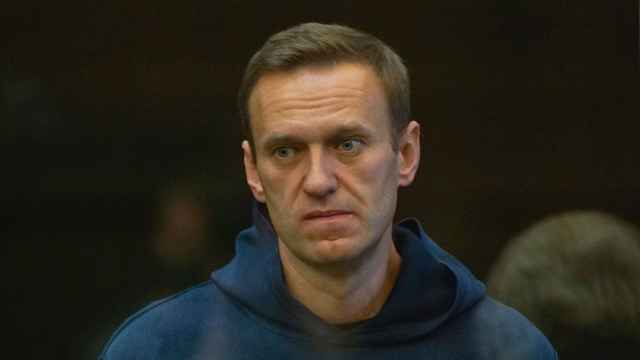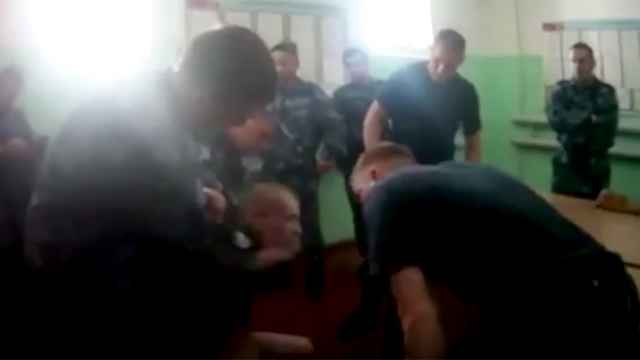Just as the Third Reich cannot be imagined without concentration camps, it is impossible to imagine Putin’s regime without its network of ever-expanding and increasingly surreal repressions. The imprisonment of people who fail to toe the official line, or reject it altogether, is held up as a warning to anyone who might get ideas of their own.
Having duped a significant part of people with propaganda straight from the Nazi playbook — that we Russians are the best, the envy of the world because no one else can be like us, and so on — the authorities were left with the question about what to do about the minority that has turned out to be insensitive to this propaganda.
Without propaganda and fear creating a fertile bed for them to grow, the regime's ideological theses cause a rejection as violent as if by gag reflex. They remind me of the science-fiction novel "The Inhabited Island" in which the Strugatskys wrote about a planet where the authorities suppressed the population with broadcasts that made them susceptible to propaganda. But two percent of the population — the freaks — were immune to the authorities’ messages and reacted to the broadcasts with attacks of unbearable headaches.
Among Russians who have not succumbed to propaganda, there are two groups that are dangerous for the authorities. Firstly, they are writers and orators. Their command of words makes their assessments of the authorities and their policies murderous for the regime, as there is nothing the system can do to prove them wrong. This is not only because these people are telling the truth, but because Putin's government, like Putin himself, is inherently incapable of engaging in discussion.
The second dangerous group is political activists. The people who go out on pickets and try, despite everything, to participate in elections, and so on. What frightens the authorities about these people is not losing control over some municipal assembly. Rather, the courage, selflessness and clarity of the position of these (most often) young people have the power to awaken sympathy even among a significant number of citizens who find themselves relating to neither the Kremlin nor their opponents. They simply sympathize with these people on a human level, which is already weakening support for the regime.
That is why the Kremlin believes writers, speakers and activists should be gagged. First, they are fined, deprived of civil rights, and declared foreign agents. Then, if they do not get the message and do not want to stop their activities or leave the country, they should be jailed. Thus, Russian repression is pragmatic, not so much a consequence of malice, immorality, and contempt for the law as it is written. There is no other way for the authorities, unable and unwilling to ensure normal life in the country, to maintain control.
On a national level, most people have not felt the Kremlin’s wrath. Over 600 political opponents of the regime are in prison, according to the human rights group Memorial. Another tens of thousands received non-custodial sentences — usually fines. In addition, there are a few hundred foreign agents.
But the goal of repression is not to take revenge, apart from in special cases like Navalny. The goal is to exercise control, for which it is unnecessary to deprive people of freedom. Scaring them is enough for that. The number of people frightened into silence by repression is tens of thousands of times greater than the number of people in prison.
For example, 67-year-old pediatrician Nadezhda Buyanova was imprisoned after a patient’s mother denounced her for spreading “fake news” about the Russian army. Previously, pediatricians were not jailed "for politics." But now all her colleagues know that they can be imprisoned on the denunciation of a patient, which means that it is better not to talk to the patient about anything at all.
Similarly, there are recent incidences of scientists being arrested for espionage. Their colleagues, seeing that these cases are out of their fingers, realize that any hint of disloyalty may also lead to their arrest, meaning they have to behave as carefully as possible. Repressions are quite rational acts of intimidation. And many people in Russia are already afraid to read the wrong book on the subway or to speak even in their own circle.
But there is another amazing layer of repression leveled against those who have already left the country and, consequently, are not under the Kremlin’s thumb. Yulia Navalnaya, widow of Alexei, was recently declared a terrorist.
А few days ago, I myself was sentenced to eight and a half years in prison in absentia for the same supposed crime as Buyanova. The indictment says that my writing creates the impression that the actions of the Russian authorities in Ukraine caused the deaths of civilians. Imagine that! Moreover, the incriminating texts are very short, meaning I received 155 days in prison for each published word and 25 days for each letter! Where else is the word so valued as in Russia?
This fear of the power of words is nothing new. The poet Osip Mandelstam said shortly before his arrest that nowhere is poetry so valued as in the U.S.S.R. After all, there was nowhere else where poets were shot.
If I were imprisoned, I would be out by 2033 at the age of 82 and a half. Though I have no complaints about my health, that would be a life sentence. People my age do not live long in prison. But I am in Europe, and until the various pro-Russia parties like Alternative for Germany come to power, European nations do not extradite to Russia.
So why does Russia issue bizarre sentences like mine? Unlike domestic repression, I cannot see a truly rational explanation. Are they trying to prevent us from returning to the country? Well, we knew we could not go back, even without these sentences. Make our lives more difficult? They have already made it as difficult as they can. Scare us? It is too late for us to be afraid.
It is possible that they, facing numerous failures, are convincing themselves that they are strong, they are powerful, They declare anyone they want a terrorist. Or maybe, by channeling their hate at anyone who dared to speak out publicly against them, they act like voodoo worshippers and these sentences are analogous to a needle-punctured doll of the enemy.
It may be true that these sentences are a message that they will one day get us. The Soviet powers that be refused to forget their enemies and, when the Red Army marched the West, tirelessly searched for those who had fled from the Bolsheviks and thought they had found safety in Latvia or the Czech Republic. We shall see how it turns out.
But the real tragic situation is for those who are already in jail. They are at the complete mercy of their jailers, who are constrained by neither morality or law. They are kept in torturous conditions, they are killed. Navalny is just the most famous example Starting with the lawyer Sergei Magnitsky, many of their prisoners have already died in prison, their deaths left uninvestigated. They are continuing their killings: Vladimir Kara-Murza, Alexei Gorinov and many others are at risk. There, behind the walls of Russian prisons, no rules apply.
Russian political prisoners are people who knew what they were doing. Going on a peaceful picket, they knew that they could be maimed in detention or given any sentence, and were prepared to never return home. They are heroes – both those whose names are known to everyone and those about whom almost no one has heard. The civilized world has no right to tolerate the daily killing of those who voluntarily went to Calvary. People who, with full awareness of the consequences of their actions, sacrificed their freedom for the freedom of others.
Russians are doing what they can. They raise money for legal support and to help prisoners’ families. They also write prisoners letters, which is infinitely important to those in captivity.
But people in the West can do a lot as well. If you mention everywhere you can that there are crystal-clear-eyed and brave people under threat of violent death in Russia, if your leaders talk about it, maybe you will save at least one of them. If you are saving even one life, you are saving all mankind. Remember the people who could be killed in Russia for fighting for the values that underpin European civilization that many take for granted.
A Message from The Moscow Times:
Dear readers,
We are facing unprecedented challenges. Russia's Prosecutor General's Office has designated The Moscow Times as an "undesirable" organization, criminalizing our work and putting our staff at risk of prosecution. This follows our earlier unjust labeling as a "foreign agent."
These actions are direct attempts to silence independent journalism in Russia. The authorities claim our work "discredits the decisions of the Russian leadership." We see things differently: we strive to provide accurate, unbiased reporting on Russia.
We, the journalists of The Moscow Times, refuse to be silenced. But to continue our work, we need your help.
Your support, no matter how small, makes a world of difference. If you can, please support us monthly starting from just $2. It's quick to set up, and every contribution makes a significant impact.
By supporting The Moscow Times, you're defending open, independent journalism in the face of repression. Thank you for standing with us.
Remind me later.



